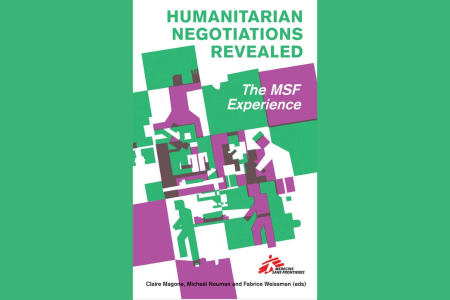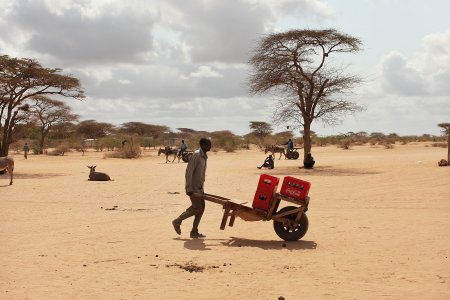
Borno, Nigeria : a critical look at our operations
Isabelle Defourny & Elba Rahmouni
In 2016, the Operations Department commissioned a critical review of the operations carried out between 2015 and 2016 in Borno State by MSF France in the north east of Nigeria. In response, and with the help of Epicentre, Judith Soussan and Fabrice Weissman from CRASH produced a detailed historical account of the analyses made of the situation by the teams, capital and headquarters at the time, as well as the objectives they set themselves, the actions they undertook, the obstacles they encountered and the results they achieved. As part of this project, some of the directors and operations managers who had been involved in these operations took a retrospective look at their own practices: were they late in responding to the catastrophic situation in the IDP camps in rural areas and on the outskirts of Maiduguri, the capital of Borno State, in 2016 and, if so, why? What conclusions can be drawn a posteriori about the operational choices made and the effectiveness of MSF intervention strategies? And, to take things a step further, what does this experience teach us about how MSF functions and how our teams work? Interview with Isabelle Defourny, Operations Director at MSF-OCP. By Elba Rahmouni.
Why did you commission this critical review?
When, in June 2016, our teams arrived in Bama – a town 71.4km away from Maiduguri where 20,000 displaced people had gathered in the grounds of a hospital controlled by the Nigerian army – they were stupefied to find such a catastrophic health situation. Mortality rates were as high as 10 for 10,000 per dayAlors que le seuil d’urgence couramment utilisé est de 1 pour les adultes et de 2 pour les enfants., and the 1,200 or so graves in the hospital grounds testified to the scale of a crisis which was clearly not recent.
A few months earlier, in January 2016, based on our analysis of the situation in the town of Maiduguri, home to a million displaced people, I had decided to transfer responsibility for the project from the emergency cell to the regular cell. At that point, we believed that the health situation was under control: the cholera outbreak was over and the mortality and malnutrition rates were back below emergency thresholds. After running massive operations throughout 2015, we wanted to take some time to get our house in order. We imagined that the situation in the localities around Maiduguri controlled by the Nigerian government – like Bama – was probably not very good, but we certainly weren't expecting things to be that bad. And yet other humanitarian operators, including United Nations agencies, the International Committee of the Red Cross and ECHO (the European Union's aid agency) had known about the situation outside the city for a long time. Back in September 2015, the ICRC had already identified severe malnutrition rates of 25% in the camp in Dikwa.
Hence my question: how come we didn’t know about a crisis like this when everyone else did? I was aware that the situation was complicated and that there were some major external obstacles. For example, we knew there were large numbers of displaced persons in Bama, but security problems made the town difficult to reach (the road between Bama and Maiduguri was an active conflict zone and there had already been attacks along that road). Furthermore, the Nigerian government was hiding the gravity of the situation and the ICRC was not talking about it openly, not even bilaterally. These were real constraints – but I was also concerned about discovering internal obstacles and the need to review some of our collective practices.
For me, taking a close and critical look at these operations was a way of trying to understand what happened. I foresaw a point where the only things we’d remember about this emergency would be our failures and late response and I felt we should share our operational experiences, difficulties and successes. As we were talking at the time about changing the way we did our evaluations, about adopting an interdisciplinary approach combining CRASH and Epicentre, I thought this would be a good opportunity to learn and work on improving our operations by discussing them.
After reading the critical review and the opinion paper written by its main authors, what is your analysis of our operations in response to the consequences of the war in the north-east of Nigeria in 2015 and 2016? Were we late in reacting?
If we’d paid more attention to what the other actors were saying, I think we could have been in Bama by the April and saved two months. There were three documents in particular, published by the United Nations and World Food ProgrammeJoint UN Multi-Sector Assessment, Borno & Yobe State, Nigeria, Summary Report, April 2016, Final, which is the official inter-agency evaluation report; the Executive Brief – over 500,000 people in Borno State face Emergency food security conditions, April 2016, which is the WFP report; and the Borno Food Security Assessment, April 15, which is an internal PowerPoint of presenting its Vulnerability Analysis and Mapping.in April 2016, containing figures that should have set alarm bells ringing. It’s important for us to be able to decipher documents that are sometimes very politically correct with regard to the governments of some of the countries in which we work. In this specific case, these reports made no specific reference to a serious situation, but if we’d examined the figures properly, and if we had been more open-minded about what people from the UN were saying at the time, we would probably have gone to Bama sooner. MSF’s habit of isolating itself from other actors is a big problem.
I also think that the analysis made of the context during the handover from the emergency cell to the regular cell was not thorough enough. For example, it is revealing that there is no written analysis to be found of the situation in the north-east of Nigeria during that period. This is a criticism that I also direct at myself because, as Operations Director, I could have asked the emergency cell to provide a more detailed analysis of the context after spending a year working in Borno. If I had, we would probably have got an answer. Maybe the emergency cell would have said: “the health situation in Maiduguri is under control but we don’t know what’s going on outside the city - we haven’t been out there”.
I don’t know whether the volume of the emergency operation implemented in 2015 had anything to do with the lateness of our intervention, whether it prevented us from picking up on other emergencies, but I’m sure that this volume wasn’t a problem in itself and that the assistance we provided to hundreds of thousands of displaced persons in the city of Maiduguri should be considered a success. In all large-scale emergency operations there are management problems and they can create opportunities for misappropriations. This is neither surprising nor insurmountable. The real problem in Borno was not the misappropriations as such, but the fact that they were never mentioned and, worse still, were not dealt with. During an emergency deployment, the case number curve and human resources curve are never in phase because it takes time to find the right people and then make sure they're available, get visas, and so on. So, during the initial phase, there are often not enough people to cope with the scale of an emergency and this can lead to management problems. Then comes a point where more human resources are available but the situation has become less serious, with a decline in mortality rates and fewer cases of cholera and malnutrition. This is the time to sort out any management problems and deal with any incidents of misappropriation, for example.
In the light of this critical review, what are your work priorities now?
On all our missions, but especially on emergency missions, we have problems producing consolidated and collective situation analyses in time to help us make the right operational choices. In concrete terms, we need to improve our ability to produce written summaries of the different perspectives provided by the field, HQ, the coordination team, the cells, Operations Department, etc. Despite numerous difficulties at all levels (the size of MSF, constant turnover, a silo mentality in the departments, etc.), we must be capable of drafting and supplying proper analyses in the various documents that we circulate, such a field visit reports and situation reports. And operational managers should then produce a document that reflects any differences of opinion in these analyses, with no points of view overlooked or ignored. On emergency missions, where we have little time for in-depth situation analyses, where security problems are frequent and operational choices are rarely simple, an explanation of these different points of view and the reasons for them is needed to legitimise the decisions that we eventually choose to implement – on issues like whether or not to accept an armed escort to visit Bama, for example, – and provide the teams with clear direction.
From what I recall of my experience in Bama, the recommendations made during field visits by very experienced support staff from HQ were not always doable by the teams in the field given their workload and the resources available at the time. So there was no point leaving them with long lists of recommendations, even if everyone agrees that, in theory, it should have been possible to implement them all. With their experience, these support staff are probably the best people to implement their own recommendations, but they are a rarely involved in this side of things. Also, they sometimes dodge the hard calls, such as admitting, for example, that: « of course, we should put all ten recommendations in place, but given the means at our disposal, we'll start with just these three”. Listening to the field and then making choices, taking “risky” decisions even if in retrospect they turn out to be the wrong one - this is the operational managers’ role. Otherwise, the danger is that they’ll do little more than take due note of the fact that what they asked to be done in the field has not been done. And what should be support to the teams will gradually turn into a control of their work.
We manage to carry out food distributions, vaccination campaigns, malaria prevention and treatment..., all these are essential in disaster situations. But then we have problems effectively transitioning from these mass operations to others that could be described as more subtle. For example, managing violence – especially sexual violence – in the camps is often a weak aspect of our response. After implementing mass operations, we need to start focusing on the most vulnerable among the vulnerable: women, people suspected of belonging to Boko Haram, etc. If we want to know what is happening in the camps where we work, we must talk to the people living there. It is the role of every team member to understand what is happening with these people, to check that the relief we are offering is pertinent. In Bama, I think we could have done this at an earlier stage – talk with the women in the camp, try to understand the context of violence they were living in and this would have helped us identify any new medical issues. In the critical review of Borno, we discover that the psychologist was the only person to raise this issue of violence. Her reports are interesting because she talks to us about the reality of the people living in the camps. Without this kind of information, it’s hard to implement the best operations.
To cite this content :
Isabelle Defourny, Elba Rahmouni, “Borno, Nigeria : a critical look at our operations”, 1 juillet 2019, URL : https://msf-crash.org/en/blog/humanitarian-actors-and-practices/borno-nigeria-critical-look-our-operations
If you would like to comment on this article, you can find us on social media or contact us here:
Contribute



Add new comment